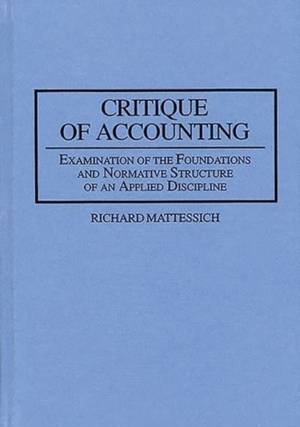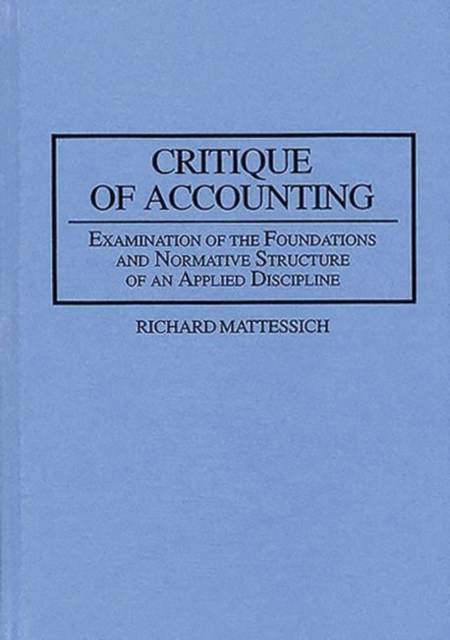
Door een staking bij bpost kan je online bestelling op dit moment iets langer onderweg zijn dan voorzien. Dringend iets nodig? Onze winkels ontvangen jou met open armen!
- Afhalen na 1 uur in een winkel met voorraad
- Gratis thuislevering in België vanaf € 30
- Ruim aanbod met 7 miljoen producten
Door een staking bij bpost kan je online bestelling op dit moment iets langer onderweg zijn dan voorzien. Dringend iets nodig? Onze winkels ontvangen jou met open armen!
- Afhalen na 1 uur in een winkel met voorraad
- Gratis thuislevering in België vanaf € 30
- Ruim aanbod met 7 miljoen producten
Zoeken
Critique of Accounting
Examination of the Foundations and Normative Structure of an Applied Discipline
Richard Mattessich
Hardcover | Engels
€ 161,45
+ 322 punten
Omschrijving
The increasing gap between the theory and practice of accounting should be taken as a warning that academics have emphasized the economics and sociology of accounting, while neglecting the applied science of accounting. This treatise points a way out of the present dilemma by focusing on the need for dealing with moral and other normative issues as well as the problem of relating means to ends. It also attempts a bold synthesis of the two major opposing camps of present-day academic accounting, the Critical-Interpretive Perspective of Great Britain, on one side, and the Positive Accounting Theory of America, on the other. The challenging issues that this book raises should be of great interest to practitioners, no less than academics, to senior undergraduates, no less than to graduate students and all those interested in an unorthodox perspective of an exciting, but often misunderstood, field.
Specificaties
Betrokkenen
- Auteur(s):
- Uitgeverij:
Inhoud
- Aantal bladzijden:
- 304
- Taal:
- Engels
Eigenschappen
- Productcode (EAN):
- 9780899308630
- Verschijningsdatum:
- 14/09/1995
- Uitvoering:
- Hardcover
- Formaat:
- Genaaid
- Afmetingen:
- 163 mm x 244 mm
- Gewicht:
- 571 g

Alleen bij Standaard Boekhandel
+ 322 punten op je klantenkaart van Standaard Boekhandel
Beoordelingen
We publiceren alleen reviews die voldoen aan de voorwaarden voor reviews. Bekijk onze voorwaarden voor reviews.











